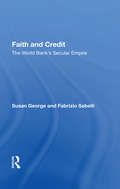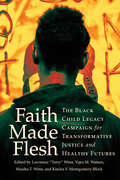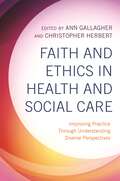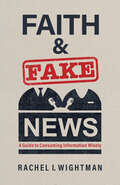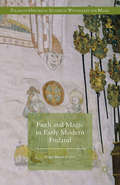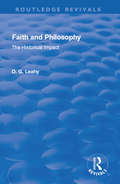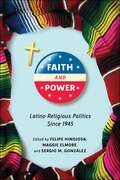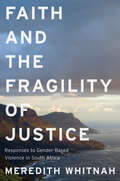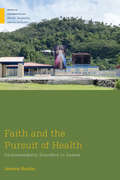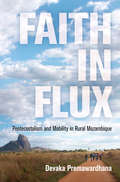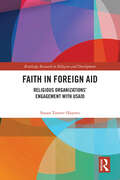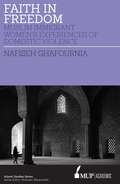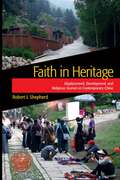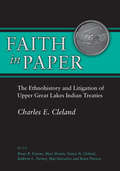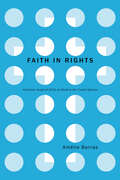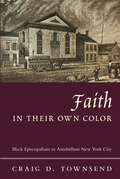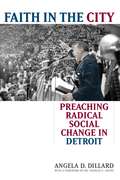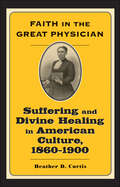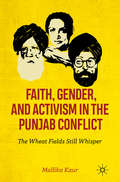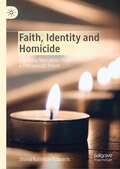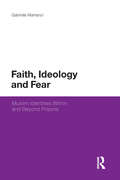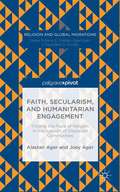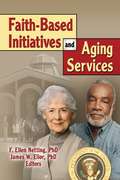- Table View
- List View
Faith And Credit: The World Bank's Secular Empire
by Susan GeorgeThe authors compare the ideologies of the free-market with religious faith, giving the World Bank the role of a secular church setting out to convert the world's underdeveloped economies to the consumer capitalist way, and so to create an enormous secular empire. This book is published in September 1994 to coincide with the World Bank's 50th annive
Faith Made Flesh: The Black Child Legacy Campaign for Transformative Justice and Healthy Futures (Publicly Engaged Scholars: Identities, Purposes, Practices)
by Lawrence “Torry” Winn, et al.Faith Made Flesh brings together the experience, insight, and stories of those actively addressing societal and educational disadvantages of Black children in Sacramento, California. Editors Lawrence "Torry" Winn, Vajra M. Watson, Maisha T. Winn, and Kindra F. Montgomery-Block seek to offer viable solutions to racial injustice by centering the voices of organizers, policymakers, educators, scholars, and young people alike. Focused on the Black Child Legacy Campaign (BCLC), a ten-year community-driven initiative to respond to disproportionate health outcomes, the contributors analyze the impact of the BCLC's successes, providing an empirically rich narrative of its transformative alliances and radical actions. Through timely and urgent case studies and personal reflections, Faith Made Flesh advances the need to address societal challenges through creative engagement with diverse institutional and individual stakeholders. The findings offer an innovative model to other regions aiming to cultivate thriving community-city-school partnerships that center the well-being of Black children and Black futures.
Faith and Ethics in Health and Social Care: Improving Practice Through Understanding Diverse Perspectives
by Ann Gallagher Christopher HerbertThis textbook looks at how different world faiths approach ethics in health and social care, and how their faith informs their practice. Equipping practitioners with the information the need, it will support them to be more reflective regarding spirituality, ethics and their provision of care.
Faith and Fake News: A Guide to Consuming Information Wisely
by Rachel I. WightmanShare if you love Jesus. Scroll past if you follow the devil. Most Christians have seen something asinine like this on Facebook and rightly dismissed it. But not every post on social media is so obviously absurd. As online spaces increase in importance, it is urgent that we as Christians consider how to love our neighbors on the internet—and this includes sharing the truth.Rachel I. Wightman has seen this problem firsthand as a librarian with over a decade of experience instructing students in information literacy. In Faith and Fake News, she shares her expertise with average Christians. This timely and essential guide explains the information landscape and its tendency toward thought bubbles, discusses techniques for fact-checking and evaluating sources, and offers suggestions on ways to engage with our neighbors online while bearing witness to Christ and the truth.
Faith and Magic in Early Modern Finland (Palgrave Historical Studies in Witchcraft and Magic)
by Raisa Maria ToivoEarly modern Finland is rarely the focus of attention in the study of European history, but it has a place in the context of northern European religious and political culture. While Finland was theoretically Lutheran, a religious plurality – embodied in ceremonies and interpreted as magic – survived and flourished. Blessing candles, pilgrimages, and offerings to forest spirits merged with catechism hearings and sermon preaching among the lay piety. What were the circumstances that allowed for such a continuity of magic? How were the manifestations and experiences that defined faith and magic tied together? How did western and eastern religious influences manifest themselves in Finnish magic? Faith and Magic in Early Modern Finland shows us how peripheral Finland can shed light on the wider context of European magic and religion.
Faith and Philosophy: The Historical Impact (Routledge Revivals Ser.)
by D. G. LeahyThis title was first published in 2003. This work examines how Christian faith has historically impacted the notion of Nous or divine mind in Western thought up to and including the present. Christian faith is seen to have inaugurated an essential transformation over time of the ancient notion of divine mind and of thought in general. Beginning with an examination of Aristotle's notion of essence, Plato's creation myth in the "Timaeus", and Plotinus' "One", it is shown how faith in the hands of Augustine and Aquinas fundamentally reshaped Western thought and made possible in the modern period the radical subjectivity of Descartes brought to perfection by Kant and Hegel. The strenuous counter-thinking of Kierkegaard, Nietzsche and Levinas is closely compared to its disarming alternative, the thinking of Jefferson, Emerson and C.S. Peirce the father of American pragmatism.
Faith and Power: Latino Religious Politics Since 1945
by Felipe Hinojosa, Maggie Elmore, and Sergio M. GonzálezIlluminates how religion has shaped Latino politics and community buildingToo often religious politics are considered peripheral to social movements, not central to them. Faith and Power: Latino Religious Politics Since 1945 seeks to correct this misinterpretation, focusing on the post–World War II era. It shows that the religious politics of this period were central to secular community-building and resistance efforts. The volume traces the interplay between Latino religions and a variety of pivotal movements, from the farm worker movement to the sanctuary movement, offering breadth and nuance to this history. This illuminates how broader currents involving immigration, refugee policies, de-industrialization, the rise of the religious left and right, and the Chicana/o, immigrant, and Puerto Rican civil rights movements helped to give rise to political engagement among Latino religious actors. By addressing both the influence of these larger trends on religious movements and how the religious movements in turn helped to shape larger political currents, the volume offers a compelling look at the twentieth-century struggle for justice.
Faith and the Fragility of Justice: Responses to Gender-Based Violence in South Africa
by Meredith WhitnahSouth Africa has repeatedly made international headlines because of its high rates of gender-based violence. In the midst of a wide range of responses to the problem, an important voice has been largely absent. Why are the religious groups that had famously protested the racial violence of apartheid faltering in their response to gendered violence in the democracy? Faith and the Fragility of Justice answers this question through a deep dive into the public discourse of three Protestant Christian organizations that had been adamant about a theological mandate to challenge apartheid, but have varied in their responses to gender-based violence in the democracy. The central argument of the book is that the organizations’ theological convictions intersect with their posture toward various social groups to shape their actions. In making this argument, Meredith Whitnah demonstrates that religious beliefs are a central dimension of institutional processes that sustain or challenge social inequality and violence.
Faith and the Pursuit of Health: Cardiometabolic Disorders in Samoa (Medical Anthropology)
by Jessica HardinFaith and the Pursuit of Health explores how Pentecostal Christians manage chronic illness in ways that sheds light on health disparities and social suffering in Samoa, a place where rates of obesity and related cardiometabolic disorders have reached population-wide levels. Pentecostals grapple with how to maintain the health of their congregants in an environment that fosters cardiometabolic disorders. They find ways to manage these forms of sickness and inequality through their churches and the friendships developed within these institutions. Examining how Pentecostal Christianity provides many Samoans with tools to manage day-to-day issues around health and sickness, Jessica Hardin argues for understanding the synergies between how Christianity and biomedicine practice chronicity.
Faith in Flux: Pentecostalism and Mobility in Rural Mozambique (Contemporary Ethnography)
by Devaka PremawardhanaAnthropologist Devaka Premawardhana arrived in Africa to study the much reported "explosion" of Pentecostalism, the spread of which has indeed been massive. It is the continent's fastest growing form of Christianity and one of the world's fastest growing religious movements. Yet Premawardhana found no evidence for this in the province of Mozambique where he worked. His research suggests that much can be gained by including such places in the story of global Christianity, by shifting attention from the well-known places where Pentecostal churches flourish to the unfamiliar places where they fail.In Faith in Flux, Premawardhana documents the ambivalence with which Pentecostalism has been received by the Makhuwa, an indigenous and historically mobile people of northern Mozambique. The Makhuwa are not averse to the newly arrived churches—many relate to them powerfully. Few, however, remain in them permanently. Pentecostalism has not firmly taken root because it is seen as one potential path among many—a pragmatic and pluralistic outlook befitting a people accustomed to life on the move.This phenomenon parallels other historical developments, from responses to colonial and postcolonial intrusions to patterns of circular migration between rural villages and rising cities. But Premawardhana primarily attributes the religious fluidity he observed to an underlying existential mobility, an experimental disposition cultivated by the Makhuwa in their pre-Pentecostal pasts and carried by them into their post-Pentecostal futures. Faith in Flux aims not to downplay the influence of global forces on local worlds, but to recognize that such forces, "explosive" though they may be, never succeed in capturing the everyday intricacies of actual lives.
Faith in Foreign Aid: Religious Organizations’ Engagement with USAID (Routledge Research in Religion and Development)
by Susan Turner HaynesThe United States contributes more foreign aid than any other state in the world, and it is often recognized as a leader in engaging religious organizations in aid delivery. Faith in Foreign Aid is the first book to closely examine how the relationship between religious organizations and USAID plays out in practice.Faith in Foreign Aid relies on an original dataset to trace faith-based funding patterns in US foreign aid from 2001 to 2021. The findings show that despite America’s push to engage religious organizations in aid, the total number of religious organizations it funds is relatively low, especially when compared with the number of USAID’s secular partners. These faith-based organizations (FBOs) also represent the minority of US-based development FBOs broadly. Relying on extensive original survey and interview data, the book suggests that many religious organizations are deterred from applying for public funding because they perceive the government as biased against them, or fear their religious mission might be challenged. In addition to investigating why some FBOs eschew government funds, the book also examines why some FBOs choose to partner with USAID and what this relationship can look like. Faith in Foreign Aid highlights the voices and experiences of FBOs, showing a way for more effective engagement between religious organizations and government actors. The book will be of interest to researchers across public policy, development, religion, and political science, as well as to practitioners at USAID and development organizations.
Faith in Freedom: Muslim Immigrant Women Experiences of Domestic Violence
by Nafiseh GhafourniaHow do Australian Muslim immigrant women understand domestic violence? How do they experience domestic violence? How do they respond to domestic violence? What role does their faith play? How do immigration-related factors intersect with culture, religion and gender to shape the women's experiences of domestic violence and responses to it? Faith in Freedom answers the above questions by analysing the Muslim immigrant women's own narratives of domestic violence. The study contributes to understandings of the intersections between factors such as gender, culture, religion and immigration, and the ways in which different social locations interact in Muslim immigrant women's experiences of abuse. Faith in Freedom examines the implications of feminist intersectional perspectives for service provision, social work education and policy. Islamic Studies Series - Volume 27
Faith in Heritage: Displacement, Development, and Religious Tourism in Contemporary China (Heritage, Tourism, and Community #6)
by Robert J ShepherdUsing the example of China’s Wutai Shan—recently designated both a UNESCO World Heritage site and a national park—Robert J. Shepherd analyzes Chinese applications of western notions of heritage management within a non-western framework. What does the concept of world heritage mean for a site practically unheard of outside of China, visited almost exclusively by Buddhist religious pilgrims? What does heritage preservation mean for a site whose intrinsic value isn’t in its historic buildings or cultural significance, but for its sacredness within the Buddhist faith? How does a society navigate these issues, particularly one where open religious expression has only recently become acceptable? These questions and more are explored in this book, perfect for students and practitioners of heritage management looking for a new perspective.
Faith in Paper: The Ethnohistory and Litigation of Upper Great Lakes Indian Treaties
by Charles E. ClelandFaith in Paper is about the reinstitution of Indian treaty rights in the Upper Great Lakes region during the last quarter of the 20th century. The book focuses on the treaties and legal cases that together have awakened a new day in Native American sovereignty and established the place of Indian tribes on the modern political landscape. In addition to discussing the historic development of Indian treaties and their social and legal context, Charles E. Cleland outlines specific treaties litigated in modern courts as well as the impact of treaty litigation on the modern Indian and non-Indian communities of the region. Faith in Paper is both an important contribution to the scholarship of Indian legal matters and a rich resource for Indians themselves as they strive to retain or regain rights that have eroded over the years. Charles E. Cleland is Michigan State University Emeritus Professor of Anthropology and Curator of Anthropology and Ethnology. He has been an expert witness in numerous Native American land claims and fishing rights cases and written a number of other books on the subject, including Rites of Conquest: The History and Culture of Michigan's Native Americans;The Place of the Pike (Gnoozhekaaning): A History of the Bay Mills Indian Community; and (as a contributor)Fish in the Lakes, Wild Rice, and Game in Abundance: Testimony on Behalf of Mille Lacs Ojibwe Hunting and Fishing Rights.
Faith in Rights: Christian-Inspired NGOs at Work in the United Nations (Stanford Studies in Human Rights)
by Amélie BarrasFaith in Rights explores why and how Christian nongovernmental organizations conduct human rights work at the United Nations. The book interrogates the idea that the secular and the religious are distinct categories, and more specifically that human rights, understood as secular, can be neatly distinguished from religion. It argues that Christianity is deeply entangled in the texture of the United Nations and shapes the methods and areas of work of Christian NGOs. To capture these entanglements, Amélie Barras analyzes—through interviews, ethnography, and document and archive analysis—the everyday human rights work of Christian NGOs at the United Nations Human Rights Council. She documents how these NGOs are involved in a constant work of double translation: they translate their human rights work into a religious language to make it relevant to their on-the-ground membership, but they also reframe the concerns of their membership in human rights terms to make them audible to UN actors. Faith in Rights is a crucial new evaluation of how religion informs Christian nongovernmental organizations' understandings of human rights and their methods of work, as well as how being engaged in human rights work influences these organizations' own religious identity and practice.
Faith in Their Own Color: Black Episcopalians in Antebellum New York City
by Craig D. TownsendOn a September afternoon in 1853, three African American men from St. Philip's Church walked into the Convention of the Episcopal Diocese of New York and took their seats among five hundred wealthy and powerful white church leaders. Ultimately, and with great reluctance, the Convention had acceded to the men's request: official recognition for St. Philip's, the first African American Episcopal church in New York City. In Faith in Their Own Color, Craig D. Townsend tells the remarkable story of St. Philip's and its struggle to create an autonomous and independent church. His work unearths a forgotten chapter in the history of New York City and African Americans and sheds new light on the ways religious faith can both reinforce and overcome racial boundaries. Founded in 1809, St. Philip's had endured a fire; a riot by anti-abolitionists that nearly destroyed the church; and more than forty years of discrimination by the Episcopalian hierarchy. In contrast to the majority of African Americans, who were flocking to evangelical denominations, the congregation of St. Philip's sought to define itself within an overwhelmingly white hierarchical structure. Their efforts reflected the tension between their desire for self-determination, on the one hand, and acceptance by a white denomination, on the other. The history of St. Philip's Church also illustrates the racism and extraordinary difficulties African Americans confronted in antebellum New York City, where full abolition did not occur until 1827. Townsend describes the constant and complex negotiation of the divide between black and white New Yorkers. He also recounts the fascinating stories of historically overlooked individuals who built and fought for St. Philip's, including Rev. Peter Williams, the second African American ordained in the Episcopal Church; Dr. James McCune Smith, the first African American to earn an M.D.; pickling magnate Henry Scott; the combative priest Alexander Crummell; and John Jay II, the grandson of the first chief justice of the Supreme Court and an ardent abolitionist, who helped secure acceptance of St. Philip's.
Faith in Their Own Color: Black Episcopalians in Antebellum New York City (Religion and American Culture)
by Craig TownsendOn a September afternoon in 1853, three African American men from St. Philip's Church walked into the Convention of the Episcopal Diocese of New York and took their seats among five hundred wealthy and powerful white church leaders. Ultimately, and with great reluctance, the Convention had acceded to the men's request: official recognition for St. Philip's, the first African American Episcopal church in New York City. In Faith in Their Own Color, Craig D. Townsend tells the remarkable story of St. Philip's and its struggle to create an autonomous and independent church. His work unearths a forgotten chapter in the history of New York City and African Americans and sheds new light on the ways religious faith can both reinforce and overcome racial boundaries. Founded in 1809, St. Philip's had endured a fire; a riot by anti-abolitionists that nearly destroyed the church; and more than forty years of discrimination by the Episcopalian hierarchy. In contrast to the majority of African Americans, who were flocking to evangelical denominations, the congregation of St. Philip's sought to define itself within an overwhelmingly white hierarchical structure. Their efforts reflected the tension between their desire for self-determination, on the one hand, and acceptance by a white denomination, on the other.The history of St. Philip's Church also illustrates the racism and extraordinary difficulties African Americans confronted in antebellum New York City, where full abolition did not occur until 1827. Townsend describes the constant and complex negotiation of the divide between black and white New Yorkers. He also recounts the fascinating stories of historically overlooked individuals who built and fought for St. Philip's, including Rev. Peter Williams, the second African American ordained in the Episcopal Church; Dr. James McCune Smith, the first African American to earn an M.D.; pickling magnate Henry Scott; the combative priest Alexander Crummell; and John Jay II, the grandson of the first chief justice of the Supreme Court and an ardent abolitionist, who helped secure acceptance of St. Philip's.
Faith in the City: Preaching Radical Social Change in Detroit
by Angela D. DillardSpanning more than three decades and organized around the biographies of Reverends Charles A. Hill and Albert B. Cleage Jr., Faith in the City is a major new exploration of how the worlds of politics and faith merged for many of Detroit’s African Americans—a convergence that provided the community with a powerful new voice and identity. While other religions have mixed politics and creed, Faith in the City shows how this fusion was and continues to be particularly vital to African American clergy and the Black freedom struggle. Activists in cities such as Detroit sustained a record of progressive politics over the course of three decades. Angela Dillard reveals this generational link and describes what the activism of the 1960s owed to that of the 1930s. The labor movement, for example, provided Detroit’s Black activists, both inside and outside the unions, with organizational power and experience virtually unmatched by any other African American urban community.
Faith in the Great Physician: Suffering and Divine Healing in American Culture, 1860–1900 (Lived Religions)
by Heather D. CurtisThis history of evangelical faith healing in nineteenth-century America examines the nation’s shifting attitudes about sickness, suffering, and health. Faith in the Great Physician tells the story of how participants in the divine healing movement transformed the ways Americans coped with physical affliction and pursued bodily wellbeing. Heather D. Curtis offers critical reflection on the theological, cultural, and social forces that come into play when one questions the purpose of suffering and the possibility of healing.Belief in divine healing ran counter to a deep-seated Christian ethic that linked physical suffering with spiritual holiness. By engaging in devotional disciplines and participating in social reform efforts, proponents of faith cure embraced a model of spiritual experience that endorsed active service, rather than passive endurance, as the proper Christian response to illness and pain.Emphasizing the centrality of religious practices to the enterprise of divine healing, Curtis sheds light on the relationship among Christian faith, medical science, and the changing meanings of suffering and healing in American culture.Recipient of the Frank S. and Elizabeth D. Brewer Prize of the American Society of Church History for 2007
Faith, Feminism, and Scholarship
by Melanie L. Harris Kate M. OttA multicultural collection of third-wave feminist voices, this book reveals how current feminist religious scholars from around the world are integrating social justice and activism into their scholarship and pedagogy. Harris and Ott divide the collection into three sections, exploring the contributors' identities as both feminist scholars and activists, what led them to the ministry as scholars, and how their scholarship is shaped by faith.
Faith, Gender, and Activism in the Punjab Conflict: The Wheat Fields Still Whisper
by Mallika KaurPunjab was the arena of one of the first major armed conflicts of post-colonial India. During its deadliest decade, as many as 250,000 people were killed. This book makes an urgent intervention in the history of the conflict, which to date has been characterized by a fixation on sensational violence—or ignored altogether. Mallika Kaur unearths the stories of three people who found themselves at the center of Punjab’s human rights movement: Baljit Kaur, who armed herself with a video camera to record essential evidence of the conflict; Justice Ajit Singh Bains, who became a beloved “people’s judge”; and Inderjit Singh Jaijee, who returned to Punjab to document abuses even as other elites were fleeing. Together, they are credited with saving countless lives. Braiding oral histories, personal snapshots, and primary documents recovered from at-risk archives, Kaur shows that when entire conflicts are marginalized, we miss essential stories: stories of faith, feminist action, and the power of citizen-activists.
Faith, Identity and Homicide: Exploring Narratives from a Therapeutic Prison
by Shona Robinson-EdwardsThis book explores the role that religion plays in the lives of imprisoned homicide offenders. Drawing on interviews in an English prison, the author examines how they narrate their life stories and how religion intersects with other categories to rebuild their personal identities after committing a crime and being labelled as murderers or killers. This book seeks to bridge the gap between macro and micro phenomena, examining religion as both a social institution and a personal experience. It also explores the mediating role of institutions with regards to the nature and extent of their influence upon individual choices and actions, and provides insights into the nature of the therapeutic prison. It seeks to create some clarity of understanding the complex nature of religiosity, narrative, identity, desistance and rehabilitation whilst critically examining elements of social identity that may restrict or enhance this process. It provides a series of recommendations for organisations working with convicted homicide offenders/offenders and speaks to academics and practitioners in the fields of criminology, sociology, psychology and religious/theological studies.
Faith, Ideology and Fear: Muslim Identities Within and Beyond Prisons
by Gabriele MarranciBased on four years anthropological research within prisons and Muslim communities in the UK, this book offers a unique discussion of the relationship between the experience of prison among Muslims and the formation of religious identity. Gabriele Marranci thoroughly examines Muslim religious life in prison, the work of Muslim chaplains and imams (and the overall impact that they have on Muslim prisoners), providing an analysis of the current prison policies aiming to prevent radicalisation, and discusses the counterproductive results of an increasing young Muslim presence in prisons, as well as the reaction of the Muslim communities to this increase. Marranci suggests that the prison environment, and increasing restrictions therein, are linked to the fear of radicalization, and are facilitating identity processes in which Islam turns into an ideology. This important study goes on to make a thorough examination of the lives of former Muslim prisoners, showing how they are particularly vulnerable to extremists' recruitment, and explaining the dynamics which have led, in certain cases, to their recommitting offences, or embarking on a path of radicalization.
Faith, Secularism, and Humanitarian Engagement: Finding The Place Of Religion In The Support Of Displaced Communities (Religion And Global Migrations Ser.)
by Alastair Ager Joey AgerFaith-Based Initiatives and Aging Services
by F. Ellen Netting James W EllorGain an understanding of the increased role religious congregations now play in providing social support to the elderlyReligious congregations and faith-based organizations (FBO) from the Jewish, Christian, and Islamic traditions have worked on behalf of older adults for centuries. But the initiation of President Bush&’s Office of Faith-Based Initiatives has raised many questions from both the traditional secular and sectarian services as well as many nontraditional services found in each community. Faith-Based Initiatives and Aging Services addresses the issues of the separation of church and state, the concerns involved in developing social services in religious congregations, and the larger public policy implications of this office. This unique book offers perspectives from traditional and nontraditional faith-based groups, as well as experts in volunteerism.The enactment by Congress of the Charitable Choice section of the federal welfare reform law combined with the creation of the Center for Faith-Based and Community Initiatives in the United States Department of Health and Human Services to signal a high-level of interest in supporting faith-based organizations. Faith-Based Initiatives and Aging Services focuses on the specific applications of services provided by religious congregations. Editors F. Ellen Netting and James W. Ellor conducted an in-depth interview with Elizabeth Seal-Scott, then Director of the Center for Faith-Based and Community Initiatives (an edited transcript of the interview is included in the book) to help promote understanding of the development and implementation of faith-based, grass roots programs.Faith-Based Initiatives and Aging Services examines: the separation of church and state Baptist perspectives on faith-based initiatives and religious liberty managing older volunteers faith organizations and ethnically diverse elders the heritage of religion and spirituality in the field of gerontology faith-related agencies and their implications for aging services the role of religious congregations in the social service systemFaith-Based Initiatives and Aging Services is an essential resource for anyone interested in developing programs for older adults in religious congregations, for human services staffs seeking to work with faith-based initiatives, and for government workers in need of a better understanding of faith-based services in their community.
